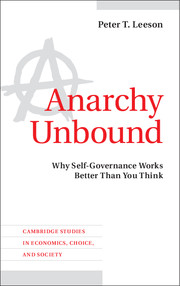Book contents
- Frontmatter
- Dedication
- Contents
- Acknowledgments
- 1 Anarchy Unbound
- Part I Self-Governance and the Problem of Social Diversity
- 2 Social Distance and Self-Enforcing Exchange*
- 3 The Laws of Lawlessness*
- Part II Self-Governance and the Problem of Violence
- Part III Self-Governance and the Problem of “Bad Apples”
- Part IV Self-Governance as Superior to the State
- References
- Index
3 - The Laws of Lawlessness*
Published online by Cambridge University Press: 05 February 2015
- Frontmatter
- Dedication
- Contents
- Acknowledgments
- 1 Anarchy Unbound
- Part I Self-Governance and the Problem of Social Diversity
- 2 Social Distance and Self-Enforcing Exchange*
- 3 The Laws of Lawlessness*
- Part II Self-Governance and the Problem of Violence
- Part III Self-Governance and the Problem of “Bad Apples”
- Part IV Self-Governance as Superior to the State
- References
- Index
Summary
Cooperation under anarchy when persons are from different social groups is one thing. When those groups are avowed enemies, it's quite another. The idea that self-governance could promote cooperation between socially distant hostiles seems absurd.
Yet it can, and it has. In the words of John Stuart Mill (1848: 882), “Insecurity paralyzes only when it is such in nature and in degree that no energy of which mankind in general are capable affords any tolerable means of self-protection.” That energy, you will see, is substantial.
This essay examines a significant and long-lasting era of intergroup anarchy among English and Scottish citizens on the Anglo-Scottish border in the sixteenth century. The border people pillaged, plundered, and raided one another as a way of life they called “reiving.” To regulate this system of intergroup banditry and prevent it from degenerating into chaos, border inhabitants developed a self-governing system of cross-border criminal law called the Leges Marchiarum. These “laws of lawlessness” governed all aspects of cross-border interaction and spawned novel institutions of their enforcement, including “days of truce,” bonds, “bawling,” and “trod.”
- Type
- Chapter
- Information
- Anarchy UnboundWhy Self-Governance Works Better Than You Think, pp. 32 - 54Publisher: Cambridge University PressPrint publication year: 2014

